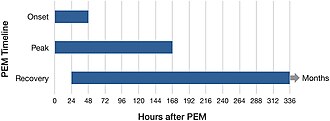Fatigue

Editor-In-Chief: Prab R Tumpati, MD
Obesity, Sleep & Internal medicine
Founder, WikiMD Wellnesspedia &
W8MD's medical weight loss NYC, sleep center NYC
Philadelphia medical weight loss and Philadelphia sleep clinics
| Fatigue | |
|---|---|

| |
| Synonyms | N/A |
| Pronounce | N/A |
| Specialty | N/A |
| Symptoms | Tiredness, exhaustion, lack of energy |
| Complications | Depression, anxiety, reduced quality of life |
| Onset | Can be acute or chronic |
| Duration | Varies; can be short-term or long-term |
| Types | N/A |
| Causes | Sleep deprivation, stress, medical conditions such as anemia, hypothyroidism, chronic fatigue syndrome |
| Risks | Poor diet, sedentary lifestyle, mental health disorders |
| Diagnosis | Clinical assessment, blood tests, sleep studies |
| Differential diagnosis | Depression, sleep apnea, anemia, hypothyroidism |
| Prevention | N/A |
| Treatment | Lifestyle changes, cognitive behavioral therapy, medication |
| Medication | Antidepressants, stimulants |
| Prognosis | N/A |
| Frequency | Common |
| Deaths | Rarely directly fatal |
Fatigue[edit]

Fatigue is a common symptom experienced by individuals across various conditions and is characterized by a persistent feeling of tiredness or exhaustion. It can be both a physical and mental state, affecting a person's ability to perform daily activities effectively.
Causes of Fatigue[edit]
Fatigue can result from numerous factors, including:
- Sleep disorders such as insomnia or sleep apnea.
- Chronic illnesses like chronic fatigue syndrome (CFS), fibromyalgia, and multiple sclerosis.
- Mental health issues, including depression and anxiety.
- Lifestyle factors such as poor diet, lack of exercise, and excessive stress.
- Medications that have fatigue as a side effect.
Symptoms[edit]
The primary symptom of fatigue is a persistent feeling of tiredness that does not improve with rest. Other symptoms may include:
- Difficulty concentrating or cognitive impairment.
- Muscle weakness or soreness.
- Headaches.
- Dizziness or lightheadedness.
- Irritability or mood changes.
Diagnosis[edit]
Diagnosing fatigue involves a comprehensive evaluation to determine the underlying cause. This may include:
- A detailed medical history and physical examination.
- Blood tests to check for anemia, thyroid function, and other potential causes.
- Sleep studies to identify sleep disorders.
- Psychological assessments to evaluate mental health conditions.
Management[edit]
Managing fatigue typically involves addressing the underlying cause. General strategies include:
- Improving sleep hygiene and ensuring adequate rest.
- Engaging in regular physical activity tailored to the individual's capabilities.
- Managing stress through relaxation techniques and counseling.
- Adjusting medications if they contribute to fatigue.
- Nutritional support and dietary changes.
See also[edit]
Ad. Transform your life with W8MD's Budget GLP-1 injections from $49.99


W8MD offers a medical weight loss program to lose weight in Philadelphia. Our physician-supervised medical weight loss provides:
- Weight loss injections in NYC (generic and brand names):
- Zepbound / Mounjaro, Wegovy / Ozempic, Saxenda
- Most insurances accepted or discounted self-pay rates. We will obtain insurance prior authorizations if needed.
- Generic GLP1 weight loss injections from $49.99 for the starting dose of Semaglutide and $65.00 for Tirzepatide.
- Also offer prescription weight loss medications including Phentermine, Qsymia, Diethylpropion, Contrave etc.
NYC weight loss doctor appointmentsNYC weight loss doctor appointments
Start your NYC weight loss journey today at our NYC medical weight loss and Philadelphia medical weight loss clinics.
- Call 718-946-5500 to lose weight in NYC or for medical weight loss in Philadelphia 215-676-2334.
- Tags:NYC medical weight loss, Philadelphia lose weight Zepbound NYC, Budget GLP1 weight loss injections, Wegovy Philadelphia, Wegovy NYC, Philadelphia medical weight loss, Brookly weight loss and Wegovy NYC
|
WikiMD's Wellness Encyclopedia |
| Let Food Be Thy Medicine Medicine Thy Food - Hippocrates |
Medical Disclaimer: WikiMD is not a substitute for professional medical advice. The information on WikiMD is provided as an information resource only, may be incorrect, outdated or misleading, and is not to be used or relied on for any diagnostic or treatment purposes. Please consult your health care provider before making any healthcare decisions or for guidance about a specific medical condition. WikiMD expressly disclaims responsibility, and shall have no liability, for any damages, loss, injury, or liability whatsoever suffered as a result of your reliance on the information contained in this site. By visiting this site you agree to the foregoing terms and conditions, which may from time to time be changed or supplemented by WikiMD. If you do not agree to the foregoing terms and conditions, you should not enter or use this site. See full disclaimer.
Credits:Most images are courtesy of Wikimedia commons, and templates, categories Wikipedia, licensed under CC BY SA or similar.
Translate this page: - East Asian
中文,
日本,
한국어,
South Asian
हिन्दी,
தமிழ்,
తెలుగు,
Urdu,
ಕನ್ನಡ,
Southeast Asian
Indonesian,
Vietnamese,
Thai,
မြန်မာဘာသာ,
বাংলা
European
español,
Deutsch,
français,
Greek,
português do Brasil,
polski,
română,
русский,
Nederlands,
norsk,
svenska,
suomi,
Italian
Middle Eastern & African
عربى,
Turkish,
Persian,
Hebrew,
Afrikaans,
isiZulu,
Kiswahili,
Other
Bulgarian,
Hungarian,
Czech,
Swedish,
മലയാളം,
मराठी,
ਪੰਜਾਬੀ,
ગુજરાતી,
Portuguese,
Ukrainian